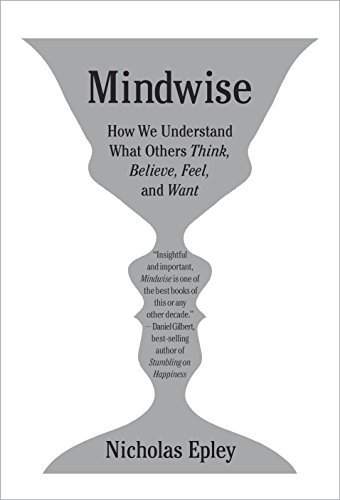
Main content start
Nicholas S. Epley
Psychology
University of Chicago
Fellowship year
2009-10 - University of Chicago - Study 32
Tyler Books
| Book Cover | Book Title and link |
|---|---|
 | Epley, Nicholas.. 2014. Mindwise: how we understand what others think, believe, feel, and want. New York: Alfred A. Knopf |
Tyler Journal Articles
Waytz, Adam; Gray, Kurt; Epley, Nicholas; Wegner, Daniel M.; . 2010. Causes and consequences of mind perception. 14(8): 383-388. http://www.sciencedirect.com/science/article/pii/S1364661310001142
Caruso, Eugene M.; Waytz, Adam; Epley, Nicholas; . 2010. The intentional mind and the hot hand: Perceiving intentions makes streaks seem likely to continue. 116(1): 149-153. http://www.sciencedirect.com/science/article/pii/S0010027710000867
Eyal, Tal; Epley, Nicholas; . 2010. How to seem telepathic: Enabling mind reading by matching construal. 21(5): 700-705. https://doi.org/10.1177/0956797610367754
Waytz, Adam; Cacioppo, John; Epley, Nicholas; . 2010. Who sees human? The stability and importance of individual differences in anthropomorphism. 5(3): 219-232. https://doi.org/10.1177/1745691610369336
Waytz, Adam; Morewedge, Carey K.; Epley, Nicholas; Monteleone, George; Gao, Jia Hong; Cacioppo, John T.; . 2010. Making sense by making sentient: effectance motivation increases anthropomorphism.. 99(3): 410-435.
Waytz, Adam; Epley, Nicholas; Cacioppo, John T.; . 2010. Social cognition unbound: Insights into anthropomorphism and dehumanization. 19(1): 58-62. https://doi.org/10.1177/0963721409359302
Epley, Nicholas; Converse, Benjamin A.; Delbosc, Alexa; Monteleone, George A.; Cacioppo, John T.; . 2009. Believers' estimates of God's beliefs are more egocentric than estimates of other people's beliefs. 106(51): 21533-21538. http://www.pnas.org/content/106/51/21533.abstract
Gneezy, Ayelet; Epley, Nicholas; . 2014. Worth Keeping but Not Exceeding: Asymmetric Consequences of Breaking Versus Exceeding Promises. 5(7): 796-804. https://doi.org/10.1177/1948550614533134
Caruso, Eugene M.; Waytz, Adam; Epley, Nicholas; . 2010. The intentional mind and the hot hand: Perceiving intentions makes streaks seem likely to continue. 116(1): 149-153. http://www.sciencedirect.com/science/article/pii/S0010027710000867
Eyal, Tal; Epley, Nicholas; . 2010. How to seem telepathic: Enabling mind reading by matching construal. 21(5): 700-705. https://doi.org/10.1177/0956797610367754
Waytz, Adam; Cacioppo, John; Epley, Nicholas; . 2010. Who sees human? The stability and importance of individual differences in anthropomorphism. 5(3): 219-232. https://doi.org/10.1177/1745691610369336
Waytz, Adam; Morewedge, Carey K.; Epley, Nicholas; Monteleone, George; Gao, Jia Hong; Cacioppo, John T.; . 2010. Making sense by making sentient: effectance motivation increases anthropomorphism.. 99(3): 410-435.
Waytz, Adam; Epley, Nicholas; Cacioppo, John T.; . 2010. Social cognition unbound: Insights into anthropomorphism and dehumanization. 19(1): 58-62. https://doi.org/10.1177/0963721409359302
Epley, Nicholas; Converse, Benjamin A.; Delbosc, Alexa; Monteleone, George A.; Cacioppo, John T.; . 2009. Believers' estimates of God's beliefs are more egocentric than estimates of other people's beliefs. 106(51): 21533-21538. http://www.pnas.org/content/106/51/21533.abstract
Gneezy, Ayelet; Epley, Nicholas; . 2014. Worth Keeping but Not Exceeding: Asymmetric Consequences of Breaking Versus Exceeding Promises. 5(7): 796-804. https://doi.org/10.1177/1948550614533134
